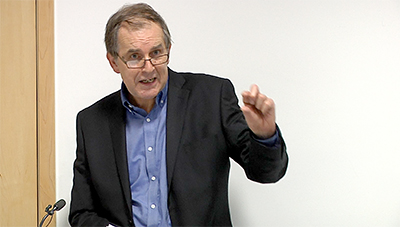David Vincent - 10 November 2015 - Conspiracy and the beginning of the democratic state in Britain 1830 - 1860
Duration: 1 hour 27 mins
Share this media item:
Embed this media item:
Embed this media item:
About this item

| Description: |
Conspiracy and the beginning of the democratic state in Britain 1830 - 1860
A public lecture by Professor David Vincent (Emeritus Professor in History, Open University). Abstract: The lecture will examine the nature of conspiracy in the years immediately following the Great Reform Act of 1832, which laid the foundation for the development of a democratic state in Britain. Its broad question will be the extent to which the new polity was accompanied by a transformation in the way in which conspiracy was conceived and communicated. It will reassess the career of the diplomat and journalist David Urquhart, who accused successive politicians, particularly Lord Palmerston, of treasonable conduct in the 1830s and 1840s in the realm of international relations. And it will examine the postal espionage crisis of 1844 and the public controversy over surveillance and official secrecy. It will deploy a range of literary and visual evidence to consider issues including the function of mass communication in generating and facilitating conspiracy theories; the shift in focus from individuals to systems as the locus of conspiracy; the changing language of conspiracy and the decline of the caricature sensibility in the democratic discourse; the professionalisation of administration and the management of official information; the role of Jeremy Bentham, honorary godfather to Urquhart and theorist of the new democratic order. |
|---|
| Created: | 2015-11-13 08:55 |
|---|---|
| Collection: | Conspiracy and Democracy |
| Publisher: | University of Cambridge |
| Copyright: | Glenn Jobson |
| Language: | eng (English) |
| Distribution: |
World
|
| Keywords: | CRASSH; Conspiracy and Democracy; David Vincent; |
| Explicit content: | No |
| Aspect Ratio: | 16:9 |
| Screencast: | No |
| Bumper: | UCS Default |
| Trailer: | UCS Default |
| Abstract: | Conspiracy and the beginning of the democratic state in Britain 1830 - 1860
A public lecture by Professor David Vincent (Emeritus Professor in History, Open University). Abstract: The lecture will examine the nature of conspiracy in the years immediately following the Great Reform Act of 1832, which laid the foundation for the development of a democratic state in Britain. Its broad question will be the extent to which the new polity was accompanied by a transformation in the way in which conspiracy was conceived and communicated. It will reassess the career of the diplomat and journalist David Urquhart, who accused successive politicians, particularly Lord Palmerston, of treasonable conduct in the 1830s and 1840s in the realm of international relations. And it will examine the postal espionage crisis of 1844 and the public controversy over surveillance and official secrecy. It will deploy a range of literary and visual evidence to consider issues including the function of mass communication in generating and facilitating conspiracy theories; the shift in focus from individuals to systems as the locus of conspiracy; the changing language of conspiracy and the decline of the caricature sensibility in the democratic discourse; the professionalisation of administration and the management of official information; the role of Jeremy Bentham, honorary godfather to Urquhart and theorist of the new democratic order. |
|---|---|
Available Formats
| Format | Quality | Bitrate | Size | |||
|---|---|---|---|---|---|---|
| MPEG-4 Video | 1280x720 | 2.99 Mbits/sec | 1.91 GB | View | Download | |
| MPEG-4 Video | 640x360 | 1.93 Mbits/sec | 1.23 GB | View | Download | |
| WebM | 1280x720 | 3.01 Mbits/sec | 1.92 GB | View | Download | |
| WebM | 640x360 | 880.53 kbits/sec | 561.09 MB | View | Download | |
| iPod Video | 480x270 | 499.35 kbits/sec | 318.20 MB | View | Download | |
| MP3 | 44100 Hz | 252.29 kbits/sec | 160.76 MB | Listen | Download | |
| Auto * | (Allows browser to choose a format it supports) | |||||

